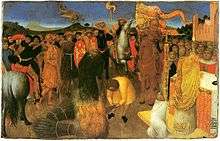Rogue (vagrant)


A rogue is a vagrant person who wanders from place to place. Like a drifter, a rogue is an independent person who rejects conventional rules of society in favor of following their own personal goals and values.
In modern English language, the term rogue is used pejoratively to describe a dishonest or unprincipled person whose behavior one disapproves of, but who is nonetheless likeable and/or attractive.[1]
History
The word rogue was first recorded in print in John Awdely's Fraternity of Vagabonds (1561), and then in Thomas Harman's Caveat for Common Cursitors (1566).
In England, the 1572 Vagabonds Act defined a rogue as a person who has no land, no master, and no legitimate trade or source of income; it included rogues in the class of idle vagrants or vagabonds. If a person were apprehended as a rogue, he would be stripped to the waist, whipped until bleeding, and a hole, about the compass of an inch about, would be burned through the cartilage of his right ear with a hot iron.[2] A rogue who was charged with a second offense, unless taken in by someone who would give him work for one year, could face execution as a felony. A rogue charged with a third-offense would only escape death if someone hired him for two years.
The 1598 Vagabonds Act banished and transplanted "incorrigible and dangerous rogues" overseas, and the 1604 Act commanded that rogues be branded with the letter "R" on their bodies.
Gaming
In many role-playing games, such as Dungeons & Dragons and other fantasy franchises, rogue is often considered a character class. The characters vary widely but are commonplace in the genre, and are considered a vital part of a balanced party. Rogues are typically dexterous and possess many skills, allowing them to excel in many areas of expertise. The rogue character's focus is often on finesse over raw strength, making them use wit and traps before direct confrontation in a fight, adept at picking locks, disarming and laying traps, use stealth and other unconventional approaches to accomplishing their goals.
See also
- Anticonformism
- Knight-errant, a wandering knight
- Musha shugyō, a samurai's personal quest
- Outlaw
- Rogues gallery
- Ronin, a wandering, masterless samurai
References
- ↑ Definition of rogue from Oxford Dictionaries Online
- ↑ 1911 Encyclopædia Britannica, Theatre